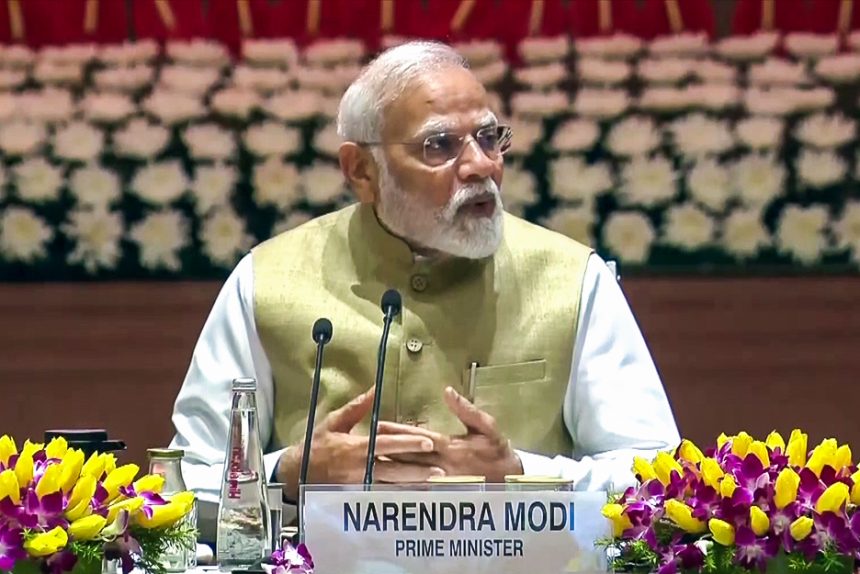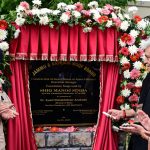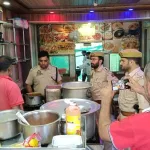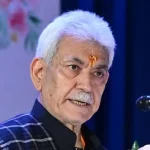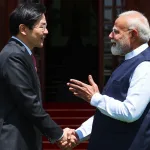New Delhi, May 24: Prime Minister Narendra Modi today chaired the 10th Governing Council Meeting of NITI Aayog at Bharat Mandapam, New Delhi. The high-level meeting was attended by Chief Ministers and Lieutenant Governors representing 24 States and 7 Union Territories. The theme of this year’s meeting was “Viksit Rajya for Viksit Bharat @2047.”
The meeting commenced with a minute’s silence in memory of the victims of the recent Pahalgam terrorist attack.
In his opening address, Prime Minister Modi stated that the dream of a Viksit Bharat (Developed India) is not merely a political agenda, but a shared aspiration of 140 crore Indians. He underscored the need for all States to collectively work towards this goal, expressing confidence that if every State, city, and village commits to development, India can achieve the vision of a developed nation well before 2047.
Highlighting India’s growing global stature, the Prime Minister noted that the country is now among the top five economies of the world and over 25 crore citizens have risen above the poverty line. He emphasized the need to accelerate this transformation and urged States to leverage their manufacturing capacities under the Government’s newly launched Manufacturing Mission.
PM Modi also pointed to heightened global investor interest in India and encouraged States to create investor-friendly environments. He cited recent trade agreements with the UAE, UK, and Australia as examples of opportunities that should be harnessed at the State level.
Emphasising the importance of skilling, the Prime Minister called attention to the National Education Policy’s focus on both education and skill development. He urged States to align their efforts with modern technologies like Artificial Intelligence, semiconductors, and 3D printing. He noted the Union Government’s approval of a ₹60,000 crore scheme to enhance skilling infrastructure and rural training hubs.
PM Modi also addressed the dual nature of cyber security—as a challenge and an opportunity. He stressed the potential of hydrogen and green energy, encouraging States to explore these emerging sectors.
Referring to the success of India’s G20 presidency in promoting the country as a global tourist destination, the Prime Minister urged each State to develop at least one world-class tourist spot, envisioning 25–30 such destinations across India.
Touching on the nation’s rapid urbanization, he called for Tier-2 and Tier-3 cities to be made engines of sustainable growth. A new ₹1 lakh crore Urban Challenge Fund will be established to provide seed funding for urban development initiatives.
The Prime Minister highlighted the critical role of Nari Shakti (women power) in India’s growth. He called for legal and policy reforms to make it easier for women to join the workforce, both in public and private sectors.
On the agricultural front, PM Modi announced the Viksit Krishi Sankalp Abhiyan, where around 2,500 agricultural scientists will visit villages to promote sustainable practices like crop diversification and chemical-free farming. He also urged States to pursue interlinking of rivers to manage both droughts and floods, commending Bihar’s Kosi-Mochi river linkage.
On health, the Prime Minister stressed preparedness for future Covid-related challenges, calling for regular checks on oxygen infrastructure and promotion of telemedicine through platforms like e-Sanjeevani.
Referring to Operation Sindoor, PM Modi said it should not be seen as a one-time mission but as part of a long-term national security strategy. He called for the institutionalization of civil defence preparedness, citing recent mock drills as a model to build upon.
Chief Ministers and Lt. Governors echoed their support for Operation Sindoor, lauding the Armed Forces and the leadership that led to precise strikes and dismantling of terror infrastructure. They also praised the strides made in the journey towards Aatmanirbharta (self-reliance) in defence.
Several States shared their Vision 2047 documents and highlighted key initiatives across sectors such as agriculture, education, entrepreneurship, digital governance, cyber security, women empowerment, and compliance reduction.
The Prime Minister directed NITI Aayog to thoroughly study the suggestions made during the session. Marking the 10th edition of the Governing Council as a milestone, he noted that the platform has evolved into a vital mechanism for cooperative federalism and national development.
Expressing his gratitude to the participating leaders, PM Modi concluded with optimism:
“Together, we are paving the path for a Viksit Bharat by 2047—powered by shared aspirations, strong federal cooperation, and united action.”


